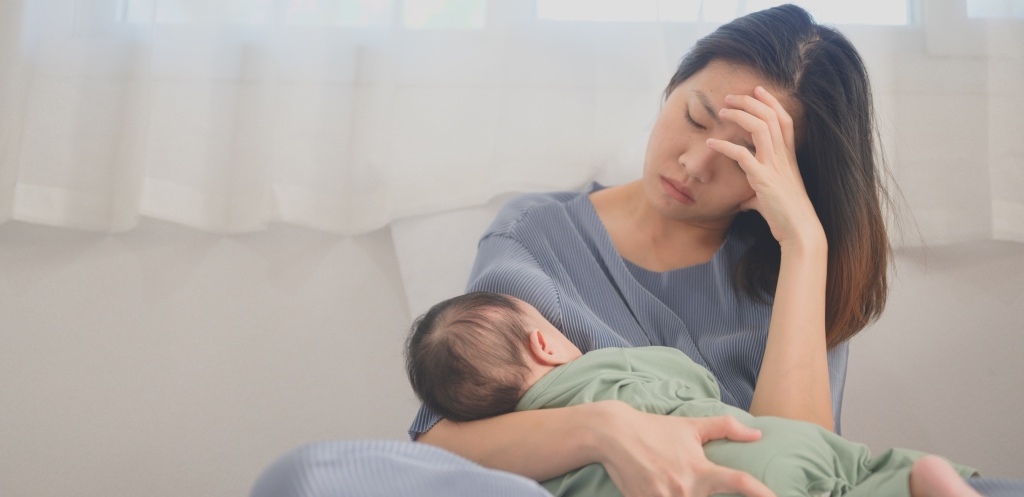Hey Mumz! Welcoming a new baby is an extraordinary chapter, overflowing with incredible joy, endless cuddles, and a love deeper than you ever imagined. But it’s also a time of monumental change – your body is recovering, hormones are shifting dramatically, and uninterrupted sleep feels like a distant memory. It’s completely normal to navigate a rollercoaster of emotions, including what’s often called the “baby blues.” These are common, temporary feelings of sadness, moodiness, or overwhelm that usually surface in the first couple of weeks after birth. But what if those intense feelings don’t just fade away? What if the challenges feel too big to handle, day after day?
It’s crucial for every new Mumz to understand postpartum depression symptoms. This isn’t just about feeling a little down; it’s a real, complex, and treatable medical condition that affects many new mothers. Knowing the signs is the most important first step towards recognizing what you’re experiencing and getting the vital support you truly deserve.
How Do You Know If You Have Postpartum Depression?
Many new mothers experience the “baby blues” in the first couple of weeks after childbirth. These feelings are usually mild and pass quickly. However, if these feelings are more intense, last longer than two weeks, or interfere with your ability to care for yourself and your baby, it might be postpartum depression. It’s important to understand the difference between baby blues vs postpartum depression. While the “baby blues” typically subside within the first two weeks, lasting only a few days to a week or two, postpartum depression involves more severe symptoms that persist for weeks or months.
Understanding Postpartum Depression Symptoms: Signs to Look Out For
Postpartum depression, often referred to as PPD, can manifest in various ways, affecting a mother’s emotions, thoughts, and physical well-being. The postpartum meaning refers to the period after childbirth. The PPD meaning specifically points to this type of depression occurring after birth. So, what is postpartum depression? It’s a mood disorder that can affect women after childbirth. The symptoms of PPD onset can appear any time within the first year after giving birth.
Here are some key postpartum depression symptoms to be aware of:
Emotional Symptoms:
- Persistent sadness after birth: This is a deep, overwhelming sadness that doesn’t lift, feeling heavy and constant. It’s much more intense than the fleeting sadness of the “baby blues.”
- Intense mood swings postpartum: You might experience rapid and intense mood swings postpartum, feeling intensely happy or hopeful one moment and deeply sad, anxious, or angry the next, often without a clear trigger.
- Feelings of hopelessness in a new mother: A profound sense of despair or feelings of hopelessness in a new mother might experience, making it hard to see a positive future, believe things will get better, or find joy in anything.
- Severe anxiety after childbirth: Beyond typical new-parent worries, you might feel severe anxiety after childbirth, leading to constant worrying, panic attacks, or even obsessive thoughts, especially about your baby’s health or safety. This can also manifest as postpartum anxiety symptoms.
- Loss of joy in motherhood: This can be one of the most distressing signs. You might feel a profound loss of joy in motherhood, finding it hard to connect with your baby, feel love or tenderness, or take pleasure in activities you once enjoyed.
- Irritability postpartum: You could find yourself feeling constantly on edge, easily frustrated, or experiencing heightened irritability postpartum, often snapping at your partner, family members, or friends.
- Feelings of worthlessness postpartum: A profound sense of not being good enough, guilt, or feelings of worthlessness postpartum can weigh heavily, making you believe you are failing as a mother.
Behavioral & Physical Symptoms:
- Difficulty bonding with baby: This can be one of the most painful and guilt-inducing symptoms. You might feel a lack of emotional connection or difficulty bonding with baby, struggling to feel affection or attachment.
- Changes in sleep patterns postpartum: Beyond normal newborn sleep deprivation, you might experience changes in sleep patterns postpartum that include severe insomnia (difficulty falling or staying asleep, even when baby sleeps) or, conversely, sleeping excessively but still feeling exhausted.
- Fatigue beyond normal new parent tiredness: You might feel an overwhelming fatigue beyond normal new parent tiredness, a deep exhaustion that simply doesn’t go away, even after resting.
- Appetite changes after delivery: This could manifest as a significant loss of appetite or, conversely, eating much more than usual as a coping mechanism.
- Withdrawal from family and friends: You might find yourself wanting to avoid social interactions, leading to withdrawal from family and friends, feeling isolated and alone.
- Unexplained aches and pains after birth: While some physical recovery pains are normal, unexplained aches and pains after birth or persistent headaches postpartum that don’t respond to usual remedies can sometimes be linked to PPD.
- Digestive issues postpartum: Some mothers might experience digestive issues postpartum like persistent nausea, stomach upset, or changes in bowel habits, which can also be stress-related symptoms.
Recognizing the full spectrum of postpartum depression symptoms and understanding that they can range from mild to severe postpartum depression symptoms is vital. If these feelings persist beyond two weeks or feel overwhelming, it’s a strong indicator that it’s time to seek help.
When to Seek Help? And How Long Does Postpartum Depression Last?
It’s incredibly important to remember that PPD is not a personal failing or a weakness, and it is absolutely not your fault. It’s a real medical condition that requires support and treatment. Spotting the signs a new mom needs help is an act of courage and self-care. If you notice any of the postpartum depression symptoms listed above, or feel a pervasive depression after childbirth, please reach out.
So, how long does postpartum depression last? Unlike the “baby blues,” which typically subside within two weeks, PPD can last for weeks, months, or even longer if left untreated. It’s a more persistent and debilitating condition. In very rare cases, a severe condition called postpartum psychosis might appear, requiring immediate medical attention.
Talk to Your Doctor:
This is the most crucial first step. Your general practitioner or obstetrician can assess your symptoms, provide an initial diagnosis, and guide you towards the right support, whether it’s therapy, medication, or a combination of approaches. Be open and honest about how you’re feeling.
Lean on Loved Ones:
Share how you’re feeling with your partner, a trusted friend, or a family member. They can offer practical help, emotional support, and simply be there to listen. Don’t try to go through this alone.
Connect with Support Groups:
Sometimes, just knowing you’re not alone makes a huge difference. Many communities in the UAE offer postpartum mental health support groups where you can connect with other mothers who understand your experience.
Your mental health during the postpartum period is just as important as your physical recovery.
Supporting Your Well-being: Products for a Smoother Postpartum Journey
While no product can cure postpartum depression symptoms, many can significantly support your physical and mental well-being, helping to alleviate daily stresses, provide comfort, and create essential moments of calm. These items can be wonderful aids on your journey to feeling better and managing the challenges of new motherhood.
Nourish Your Body:
After childbirth, your body has gone through immense changes and needs extra support for recovery and energy. Consider discussing specific vitamins and supplements with your doctor, such as postnatal vitamins, which are designed to aid your recovery and combat fatigue.
Self-Care Moments:
Even five minutes of self-care can make a difference. Gentle creams for skin care like stretch mark creams or hydrating lotions can provide a soothing moment of pampering and connection with your changing body, helping you feel a little more like yourself.
Get Out & About:
Fresh air and gentle movement can do wonders for your mood and energy levels. A comfortable baby stroller makes it easy to get out for a walk with your baby, helping you feel more connected to the outside world, offering a change of scenery, and encouraging light physical activity.
Rest & Reassurance:
Sleep deprivation can intensify feelings of overwhelm and exhaustion. A reliable baby monitor can give you the peace of mind you need to rest when your baby is sleeping, knowing you’ll be alerted if they need you. This indirectly helps you get valuable hours of sleep, even if in short bursts.
Feeding with Ease:
Comfortable feeding experiences can significantly reduce stress and physical strain. A supportive nursing pillow can ensure a comfortable latch, benefiting both you and baby. If you’re pumping, a good breast pump can offer vital flexibility, allowing you to manage feeding schedules, share feeding duties, and ensure you can get some crucial breaks or sleep.
Comfortable Wear:
Feeling good in your clothes can subtly boost your mood. Soft maternity pyjamas or comfortable nursing tops are designed for ease and comfort during your new routine.
Home Helpers:
Even small conveniences like an ergonomic baby carrier can make a difference, allowing you to keep baby close while freeing up your hands, reducing daily hassle and the feeling of being overwhelmed.
Remember, these products are tools to support you. They are part of a holistic approach to managing the challenges of postpartum life and complementing professional medical or psychological support.
Common Questions About Postpartum Depression
1. How do you know if you have postpartum depression?
You might have postpartum depression if you experience persistent sadness after birth, intense mood swings postpartum, severe anxiety after childbirth, loss of joy in motherhood, difficulty bonding with baby, fatigue beyond normal new parent tiredness, or changes in sleep patterns postpartum that last longer than two weeks. These feelings are more severe and persistent than typical “baby blues.”
2. How long did your postpartum depression last?
The duration of PPD varies for each individual. Unlike the “baby blues” which usually resolve within two weeks, postpartum depression can last for several weeks, months, or even over a year if left untreated. Seeking professional help early can significantly shorten its duration and severity.
3. What causes postpartum depression?
There isn’t one single cause for PPD. It’s often a combination of factors including dramatic hormonal shifts after childbirth, extreme sleep deprivation, physical recovery from birth, emotional stress from new responsibilities, a history of depression or anxiety, and lack of support. It’s not caused by anything you did or didn’t do.
4. What is the 5-5-5 rule for postpartum?
The 5-5-5 rule is a coping strategy for moments of overwhelm, often suggested for mental well-being in postpartum. It’s about taking a short pause:
- 5 minutes: Engage in deep breathing or mindfulness.
- 5 things: Identify 5 things you can see, hear, or feel in your immediate environment to ground yourself.
- 5 acts: Think of 5 simple, kind acts you can do for yourself or others, even if small.
Conclusion: Be Kind to Yourself, Mumz – You Deserve Support
Understanding postpartum depression symptoms is vital, not just for you, but for your baby and your family too. Your well-being is the very foundation of your baby’s happiness and healthy development. Be kind to yourself, seek help without hesitation, and know that you are strong, capable, and immensely deserving of support. Mumzworld is here to help you find every essential product that contributes to your comfort, recovery, and peace of mind as you navigate this beautiful, challenging, and incredibly rewarding journey of motherhood.







